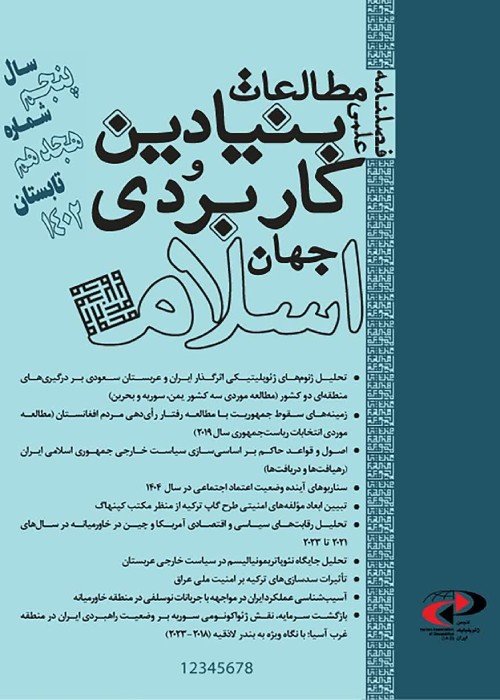The Role of Women in the Development Process of Islamic Countries
The societies development depends on the maximum participation of all segments of society and the status of women as half of human society has an important and PLAY important role in developing countries. However, women in many countries around world face various threats to life, health and employment, and the lack of social and political influence and decision-making power, has increased their challenges in face of above issues. Women's education is seen as a climax in development process, The development of education at various levels by using sufficient facilities, makes it possible to make the most appropriate use of this social human capital in process of socio-economic development. Therefore, this indicator is on high priority. Education is one of the most important tools that enhance women’s society position and empower them, directly or indirectly. It is important to address the issue of development in Islamic countries as they account for more than 2.5 billion people and 20% of all world's population and on other hand geographical distribution and more importantly, strategic and geostrategic location. Review of Literature:Various approaches have focused on the role of women in development, which is Mamsen divided into three categories:"women in development " "women and development " “gender and development” Women in development, which emerged in the early seventies and provided a framework for the modernization of development models. This model accepted the negative consequences of development for women, and outlines the ways in which women can strive to be more secure and gain access to education, labor markets and material resources. And believes that women's individual efforts and the shift in technology access, credibility and outsourced services, ensure women's development and empowerment. (Momsen, 2003: 12-13). Women and development fit into the model of dependency theory and emphasizes that women need to pursue their own projects to break free from male market domination. (Heinz, 2011: 293). Gender and development emerged in the 1980s and emphasized the re-examination of social, political, economic structures as well as development policies from the perspective of gender relations. This view emphasizes the differences and limitations that men and women are facing. In this study, we used the Gidden's Structural Theory for research Framework. According to Giddens's theory, individuals are the constructors of community culture, and the culture of society also shapes individuals' thoughts and there is a dialectical relationship between them. In Islamic countries, religious values of Islam can be seen as a structure and religious beliefs of individuals as agents, and the process of development must be analyzed accordingly. The more religious reading in an Islamic country facilitates the presence of women in the public arena, the role of women in development is greater.
The research method of this research was documentary by analyzing those documents which contain information about the phenomena we intend to study (Bailey 1994). after gathering the data and categorizing them, the research community of Islamic countries and the statistical sample of women in selected Islamic countries was compared.
It is wrong if the process of development in Islamic countries is analyzed by Western standards. In the meantime, some Islamic countries that have adopted Western secularist and liberalist values in line with Islamic values and have created a specific blend of their own society have largely come close to Western development based largely on material prosperity. Turkey and the United Arab Emirates are among those countries. Iran in some indicators, such as women's education, especially at higher levels, even with Western development criteria ranked higher than most countries. In an effort to provide a definition of Islamic development, "Continuously improving the cultural, social, economic, political and human capacities of countries and their relationship to promoting justice, quality of life and human perfection." Dr. Panahi said. Islam teaches men and women to be different in nature and biology, but the difference is in the form of proportion, not the flaws and perfection of men and women complementary and accelerating progress.
Gender Gap Index, examines the social, economic, political, and legal opportunities available to societies and their impact on women. This indicator expresses the number of country opportunities for development are evenly distributed between two sexes. This index will pay in case of economic and opportunity participation of women in labor force participation, wage and salary equity, attendance in managerial, legislative and professional positions. In field of education, it has focused on literacy rates, graduation rates, and attendance at top government jobs, and in the field of health refers to gender at birth and life expectancy. in terms of gender gap index, Iran is higher than Yemen, Iraq, Syria and Afghanistan in Islamic countries. But according to World Bank statistics, it is lower than Saudi Arabia, Turkey, the UAE, Qatar, Bahrain, Kuwait and Oman. In terms of participation and economic opportunity, is lower than Bahrain, Saudi Arabia and Turkey. Finally, despite the fact that women in Iran are in a good position compared to the Islamic countries in terms of health and education in particular, they are far behind in favor of other indicators that lead to policy and decision making and macro decisions. It needs to be legally executed for pathological review.
- حق عضویت دریافتی صرف حمایت از نشریات عضو و نگهداری، تکمیل و توسعه مگیران میشود.
- پرداخت حق اشتراک و دانلود مقالات اجازه بازنشر آن در سایر رسانههای چاپی و دیجیتال را به کاربر نمیدهد.


